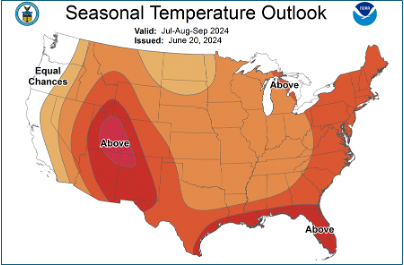Can Northeast Beat Heat Again?
June 24, 2024
The July–September seasonal temperature outlook from NOAA shows above average probabilities of above average temperatures across the U.S., including in the I-95 corridor which fared better than most last summer.
The summer of 2023 was the hottest on record, according to data dating back to 1880. Forecasts suggest this summer will be warmer. Despite concerns of elevated risk of energy shortfalls by NERC (North American Electric Reliability Corporation), the U.S. power grid largely withstood the test of 2023. No region of the country experienced significant blackouts caused by unmet electricity demand.
While global average temperatures climbed higher in 2023, some U.S. regions fared better than others. The East Coast recorded a relatively normal summer. But NOAA forecasts that 2024 will be drastically different, with the I-95 corridor at the center of heat waves and with only a few states in the upper Midwest experiencing average summer temperatures.
The Energy Information Administration expects an increase in cooling demand for this summer with 7% more forecast cooling degree days in 2Q24 and 3Q24 than the same quarters in 2023.
Battery storage continues to demonstrate its value in these conditions. Storage creates a smarter, more flexible, and more reliable grid, helps transition away from fossil fuels, and mitigates the impact of rising temperatures on the electric grid.

